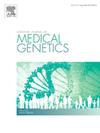自动变异再评估可实现人力平衡,并提供与临床相关的结果:以遗传性心脏病为例。
IF 1.6
4区 医学
Q3 GENETICS & HEREDITY
引用次数: 0
摘要
背景:遗传学研究结果影响着对疑似遗传性心脏病患者的临床治疗。随着时间的推移,新知识的出现,基因变异的分类可能会发生变化。对已报告的变异进行系统的人工重新评估需要大量人力成本。我们应用自动变异分类器对以前报告的变异进行重新评估,以评估此类工具可如何协助人工重新评估。方法:在过去(2010-2022 年),我们对疑似遗传性心肌病或离子通道疾病的患者(N=2,987)进行了筛查,以检测多达 114 个基因中至少一个基因的遗传变异。我们报告了 1,455 个独特的变异基因,其中 742 个属于 14 个最相关的基因。在 14 个基因组中,我们将报告的分类与自动分类器的分类进行了比较,并人工重新评估了所有变异的变异分类。在其余的基因(N=100)中,只有自动分类器预测对临床有影响的变异,如意义不确定的变异到可能致病或相反的变异,才进行人工重新评估:我们在 14 个基因组中发现了 9%(66/742)具有临床影响的变异。其中,91%的变异本可以通过评估 120 个自动分类器预测有临床影响的变异来确定。在剩余的 100 个基因中,3%(22/713)的基因在人工重新评估后发现了临床影响的变化:结论:使用自动分类器可减少识别变异的工作量,因为变异类别的改变可能会对临床产生影响。因此,我们建议使用此类工具来识别与人工重新评估最相关的变异,以改善患者护理。本文章由计算机程序翻译,如有差异,请以英文原文为准。
Automated variant re-evaluation is labor-balanced and gives clinically relevant results: Hereditary cardiac disease as a use case
Background
Genetic findings influence clinical care of patients suspected of hereditary cardiac diseases. As additional knowledge arises over time, the classification of genetic variants may change. The labor cost associated with systematic manual reevaluation for reported variants is substantial. We applied an automated variant classifier for reevaluation of previous reported variants to assess how such tools may assist in manual reevaluation.
Methods
Historically (2010–2022), patients (N = 2987) suspected of inherited cardiomyopathies or ion-channel disorders were screened for genetic variants in at least one of up to 114 genes. We had reported 1455 unique variants, of which 742 were among the 14 most relevant genes. In the 14-gene-group, we compared our reported classification to that of an autoclassifier and manually reevaluated variant classification of all variants. Among the remaining genes (N = 100), only variants where the autoclassifier predicted change of clinical impact, such as variant of uncertain significance to likely pathogenic or oppositely, were manually reevaluated.
Results
We identified 9% (66/742) of variants with clinical impact in the 14-gene-group. Of these, 91% could have been identified solely evaluating the 120 variants where the autoclassifier had predicted a change of clinical impact. In the 100 remaining genes, a change of clinical impact was identified in 3% (22/713) after manual reevaluation.
Conclusion
Using an autoclassifier reduces the workload to identify variants likely to have a change in variant class with clinical impact. Hence, we recommend using such tools to identify the variants most relevant to manually reevaluate to improve patient care.
求助全文
通过发布文献求助,成功后即可免费获取论文全文。
去求助
来源期刊
CiteScore
4.10
自引率
0.00%
发文量
193
审稿时长
66 days
期刊介绍:
The European Journal of Medical Genetics (EJMG) is a peer-reviewed journal that publishes articles in English on various aspects of human and medical genetics and of the genetics of experimental models.
Original clinical and experimental research articles, short clinical reports, review articles and letters to the editor are welcome on topics such as :
• Dysmorphology and syndrome delineation
• Molecular genetics and molecular cytogenetics of inherited disorders
• Clinical applications of genomics and nextgen sequencing technologies
• Syndromal cancer genetics
• Behavioral genetics
• Community genetics
• Fetal pathology and prenatal diagnosis
• Genetic counseling.

 求助内容:
求助内容: 应助结果提醒方式:
应助结果提醒方式:


